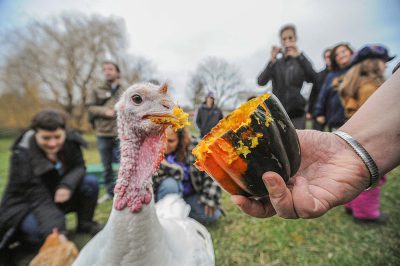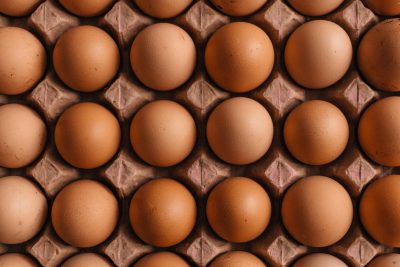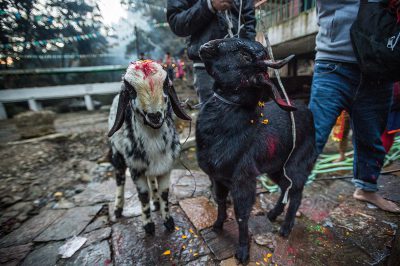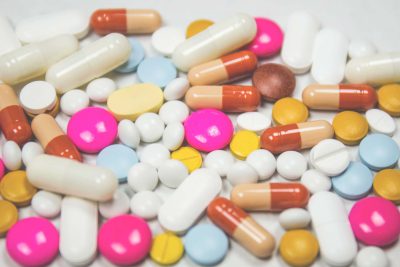This holiday season, we want to make the case for having a meat-free Thanksgiving: for animals, for the planet, for workers, for your own health, and for the health of people all over the world. Read on to find out how one small dietary decision can create a huge ripple effect.
What Is Bad About Eating Turkey?
It’s pretty clear that eating turkeys is bad for turkeys, though most people don’t realise just how bad, and nor do they know that it is bad for us and the planet, too. If you care about your health, global health, reducing suffering in the world, or protecting our planet from the impacts of climate change – and who doesn’t care about one or more of those? – then read on to find out just why we advocate choosing plant-based foods this Thanksgiving.
How Many Turkeys Are Killed Each Year For Thanksgiving?
Around 46 million turkeys are slaughtered for Thanksgiving. That’s more than the entire human population of California, all killed just for one meal on one day.
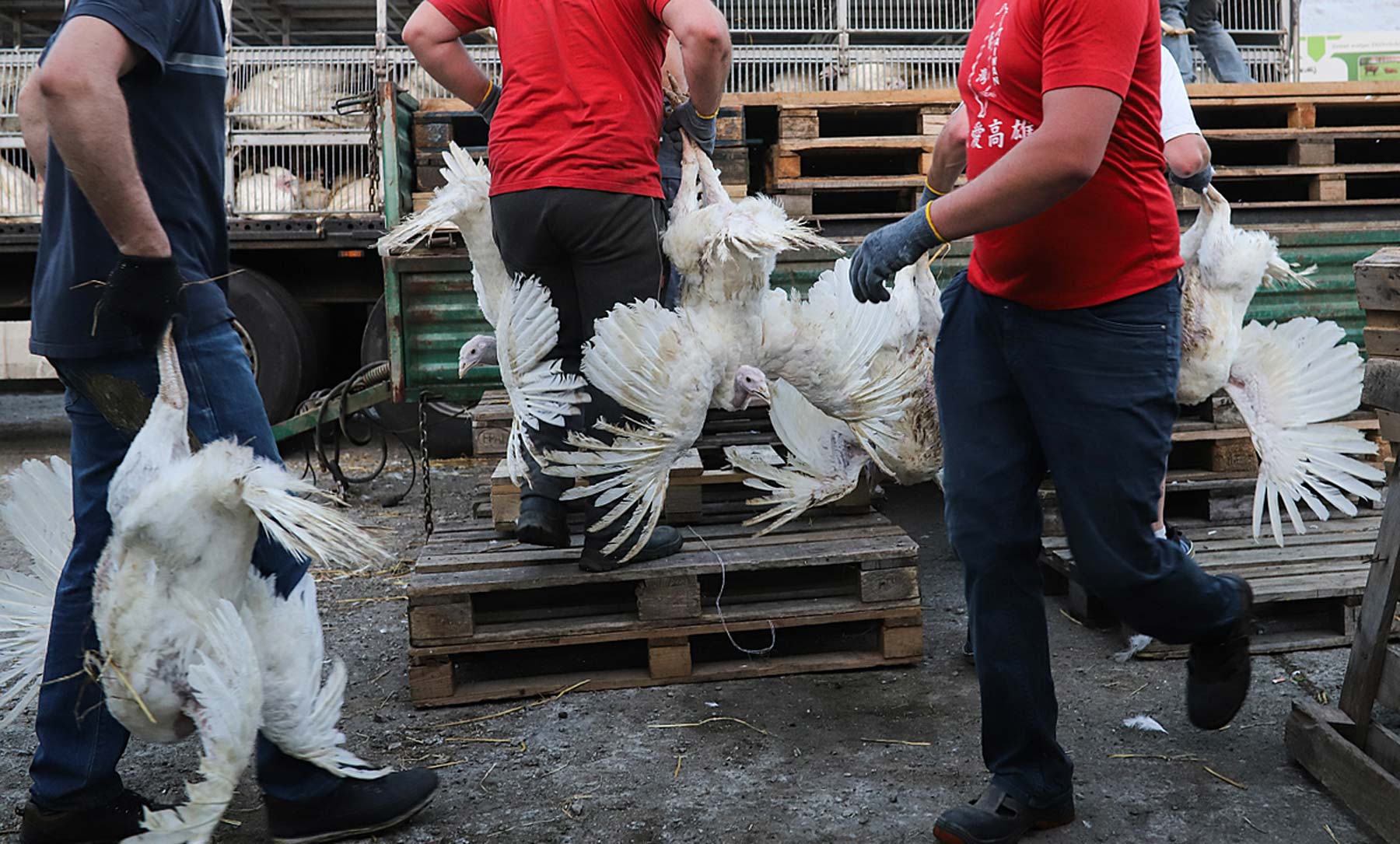
Do Turkeys Feel Pain?
Of course they do! And so when they are bred with physical traits that cause them to suffer, when they are reared in appalling conditions, when they are trucked long distances to slaughter, and when they are killed without protection from federal law, they suffer. We take away their joy, their freedom, their sense of safety and their lives. So, today, we invite people to ask: How do we feel about taking so much away from an animal to demonstrate our gratitude for all that we have?
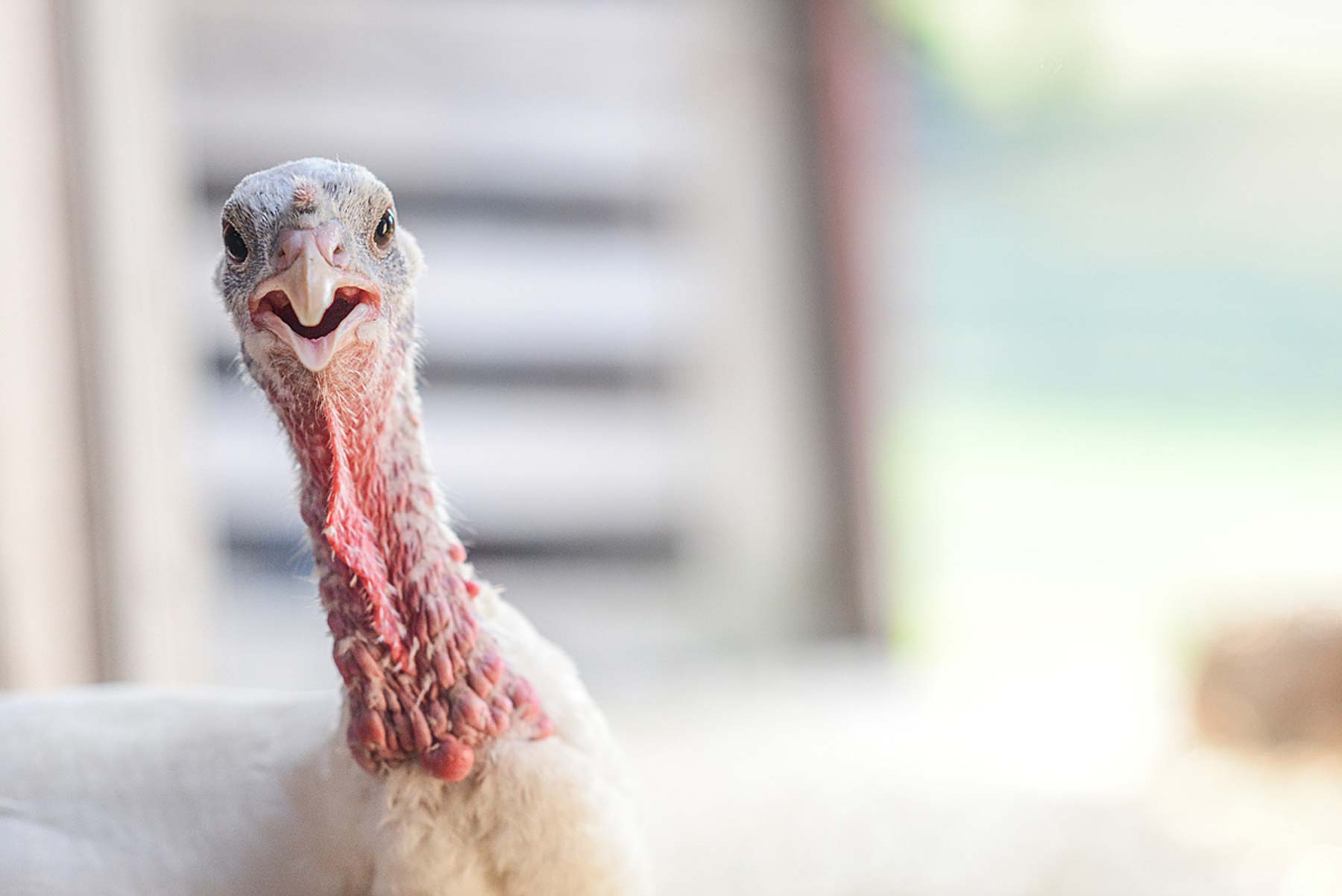
10 Reasons Why You Should Not Eat Turkey
There are lots of reasons to celebrate without turkey this Thanksgiving. Here are our top ten.
1. Turkeys Are Individuals
When we consider numbers as large as 46 million, it is easy to forget that each one of those animals is an individual with his or her own personality, preferences, behaviors and abilities. It’s only when we get to know individual birds, such as those rescued and now living safely in sanctuaries, that we get a sense of just how different these birds are from one another, like dogs, and like humans. So, let’s meet just one turkey who was miraculously rescued from Thanksgiving. This is Tutu.
Tutu is friendly and outgoing, bold and very inquisitive. And she is very chatty, making cheeps and chirps as she goes about her business, exploring the sanctuary and spending time with her friends. She lives at Farm Sanctuary in upstate New York.
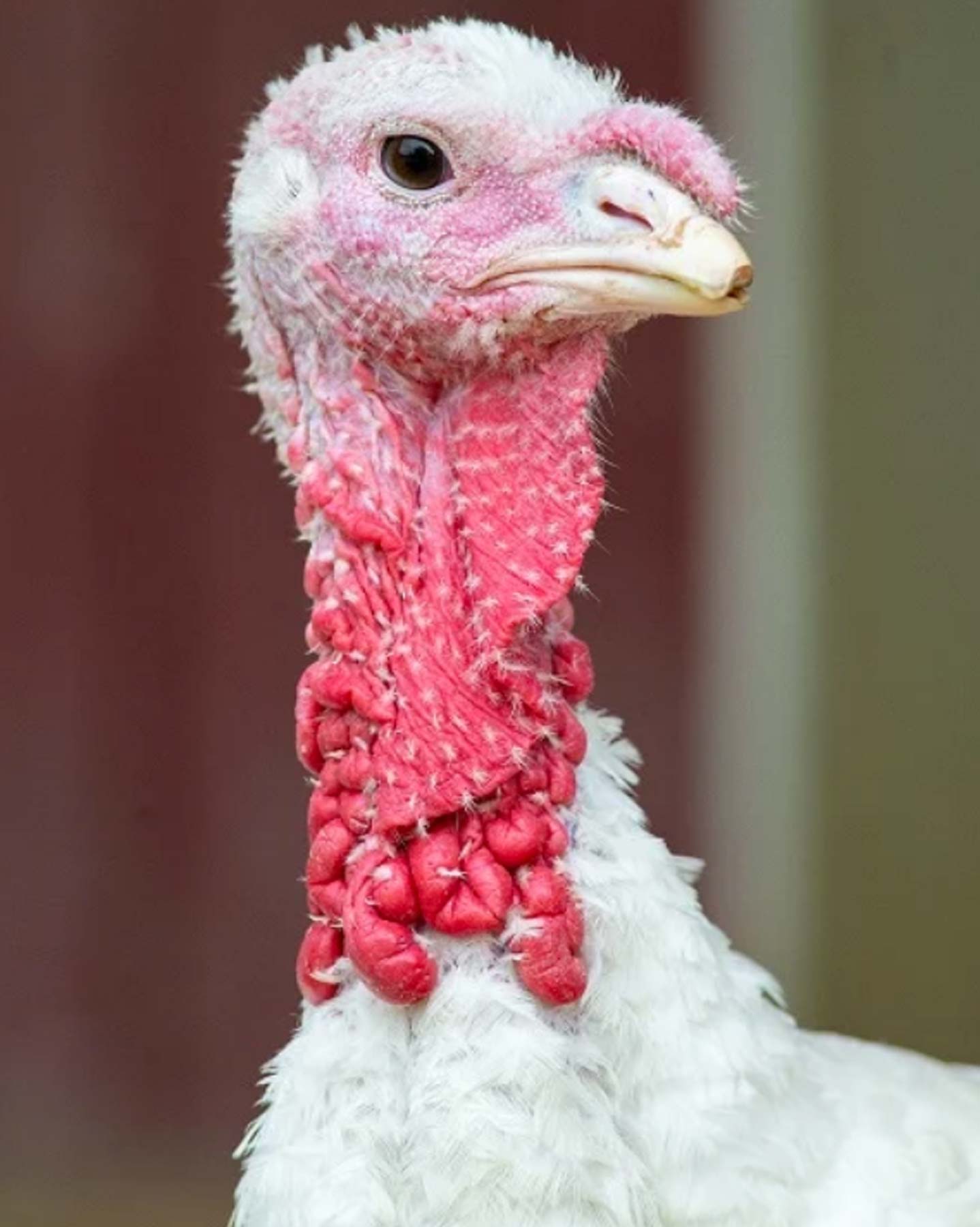
2.Turkeys Have Feelings
With personality and individuality come feelings – both physical sensations and emotional sensitivity. And the emotional deprivation of turkeys begins even before they have hatched. Birds are amazing moms and turkeys – like many other species – communicate with their young when the chicks are still in their shells. The bond they form helps their chicks to feel secure and protected. But turkeys reared inside industrial facilities are incubated away from their mothers. On their first day of life outside the shell, they are packed into crates and sent on long journeys to farms. Most are reared indoors with nothing to occupy their bright minds. They will never get to forage or explore. They will never get to display their natural behaviors. They might not know exactly what they are missing, but they know for sure – as chicks around them succumb and die in the harsh conditions – that theirs is not a happy life.
3. Turkeys Are Kept In High-stress Environments And Poor Conditions
No animal deserves to live in a factory farm. There is a ‘pack ‘em high, sell ‘em cheap’ approach to farming turkeys, except these are living beings, not cans of beans. Because exercise uses energy and energy requires food, the birds are given nowhere to go and nothing to do so as not to waste an ounce of food. And for birds who would naturally live in small flocks to be packed together with thousands of others, life is very stressful. It can cause the birds to harm one another. But instead of improving their lives so they don’t injure each other, farmers commonly mutilate the birds – cutting off the sharp end of their beaks – to reduce the damage they do when stress drives them to aggression. Because of the barren, overcrowded surroundings, illness and injuries are commonplace. Individual treatment is both impossible and uneconomic, and so millions of turkeys suffer to death right there in the sheds.
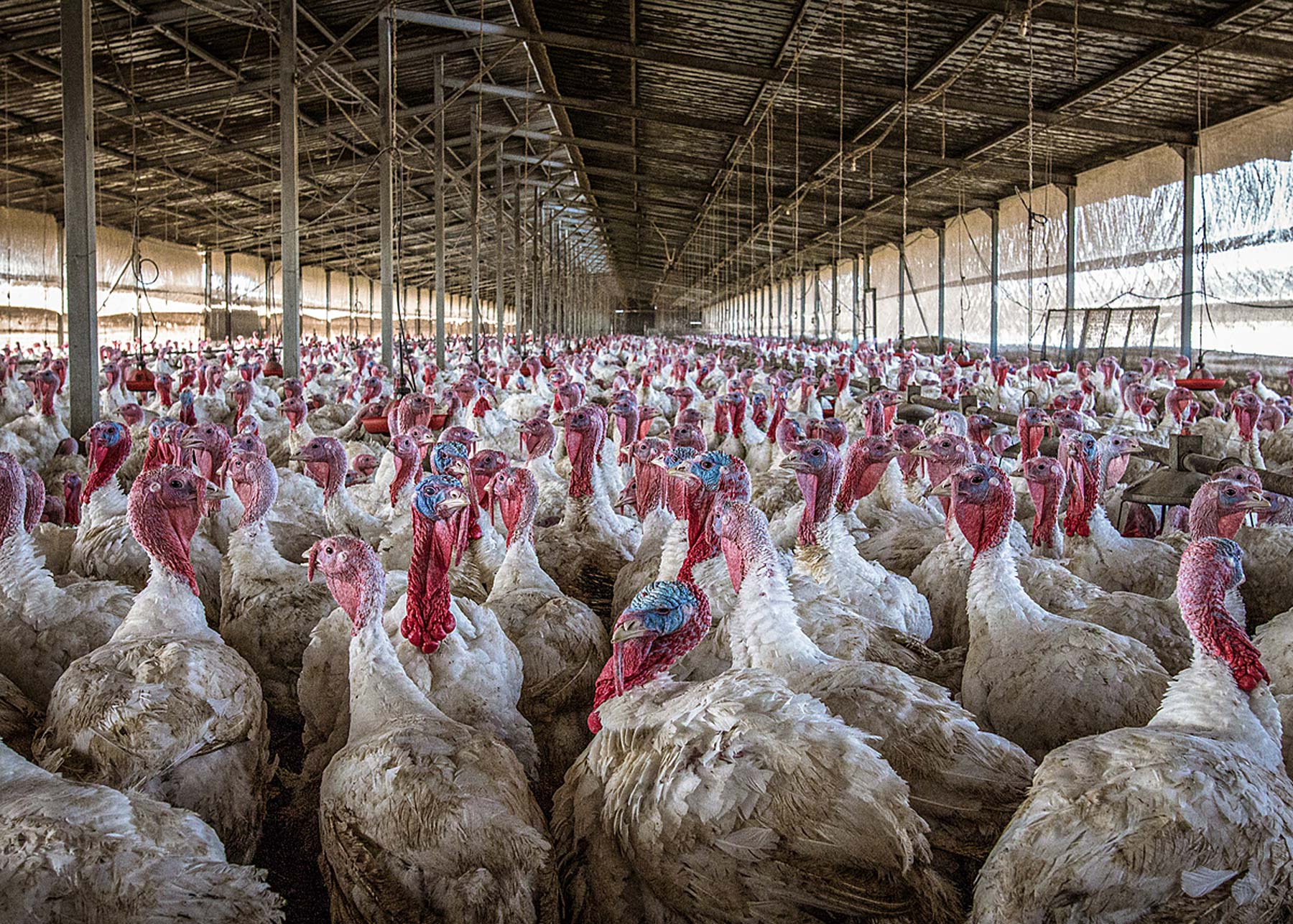
4. Dangerous Working Conditions On Turkey Farms
Factory farms are also awful places for people. Often CAFOs (Concentrated Animal Feeding Operations) are located in poorer rural areas. Workers are paid poverty wages and exposed to many dangers. When it comes to farming turkeys (and chickens), workers are particularly susceptible to respiratory illness. The dust in the units contains molds and other microorganisms, which can make workers sick. Exposure to these airborne particles (known as ‘poultry dust’) is known to cause or exacerbate asthma, chronic bronchitis, chronic airways obstructive disease (COPD), allergic alveolitis, and organic dust toxic syndrome (ODTS). Workers are also exposed to ammonia and hydrogen sulfide from the birds’ droppings, which can also adversely affect their health, while also polluting the environment.
5. Turkeys Are Sexually Molested And Abused
Farmed animals are selectively bred to have characteristics that are commercially valuable. In the case of turkeys, that means a large breast. But these desired attributes almost always come at a cost to the animals’ wellbeing. For turkeys, the extra weight puts pressure on their skeletal systems, causing leg deformities, bone fractures and lifelong pain. The large breast also means they are unable to mate naturally. And so ‘turkey milkers’ are employed. The ‘operator’ holds the male birds’ legs apart, while the ‘milker’ massages the area to collect the semen. There is absolutely nothing natural about eating turkey.
6. Inhumane Slaughter Methods
It is extraordinary that The Humane Methods of Slaughter Act, which attempts to minimize the significant trauma inflicted at slaughter, does not apply to turkeys (or chickens, ducks, geese or any other birds). There is no doubt that slaughter causes unimaginable suffering to these sensitive birds. They may be shackled, fully conscious, by already painful or broken legs. The stunning process fails all too often, and countless birds go to the knife, experiencing every moment of their death. It is utterly inhumane, but this is the norm in the United States and elsewhere.
7. Health Risks Of Eating Turkey
There are many pathogens associated with turkey, including clostridium perfringens, campylobacter, and salmonella. These can cause diarrhea, fever, and stomach cramps, and can last a few hours or a few days. They can even cause fatalities. Why risk it?
8. Turkeys Can Bring Health Problems To Humans
While food poisoning is unpleasant at best, there is a much greater threat to our health which comes from farming these birds. The conditions that turkeys and chickens are kept in, and the fact their immune systems are so weak, means that viruses can easily take hold, circulate and mutate. Experts have long believed that the next global pandemic could come from a ‘poultry’ farm. Already, there are bird viruses that have transmitted to people via factory farms, and these have a 60 per cent mortality rate. If these viruses continue to mutate – which they will – it will only be a matter of time before this virus works out how to transmit more easily from person to person.
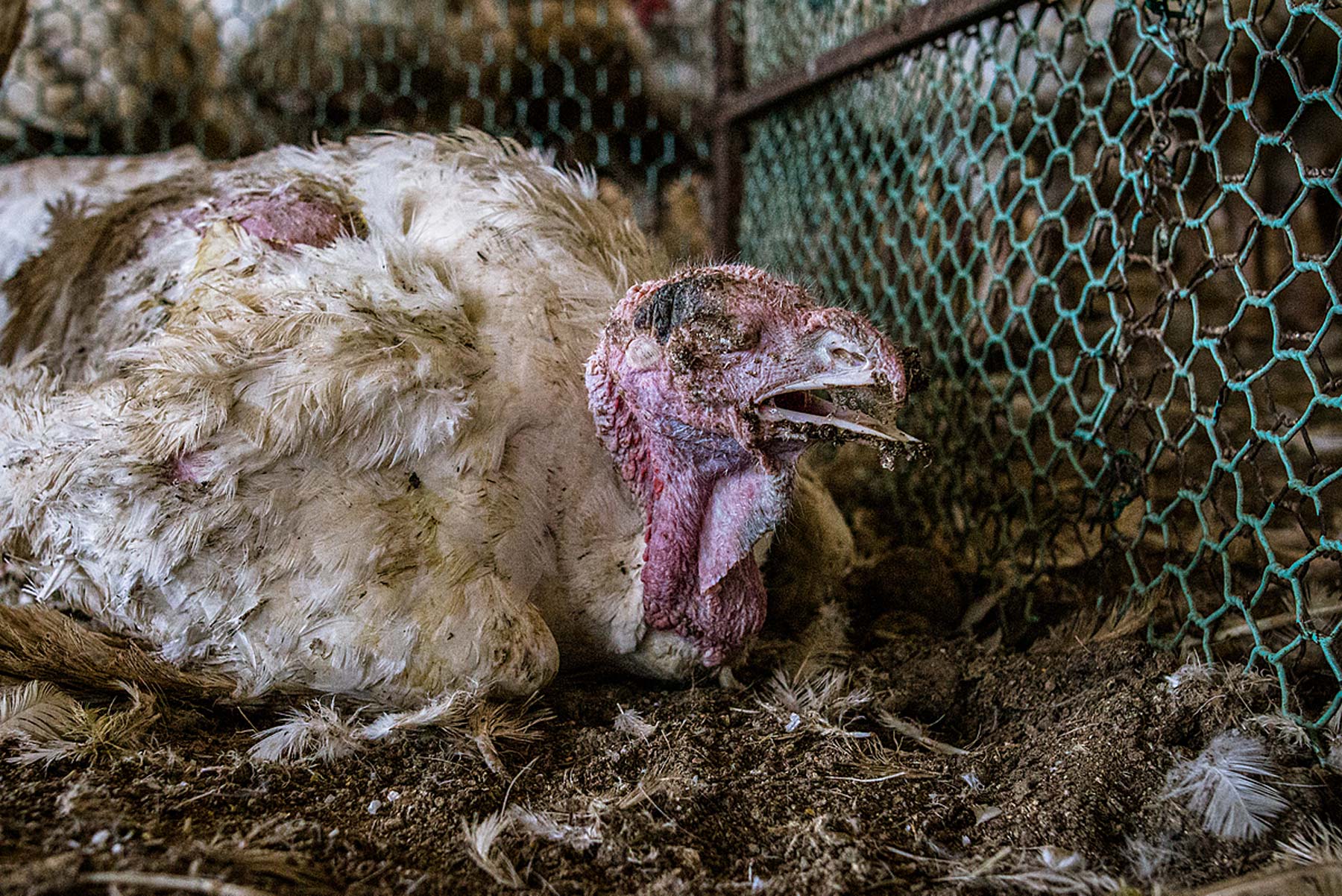
9. Turkey Farming Contributes to Antibiotic Resistance
When we misuse and overuse antibiotics, we herald the day that they no longer work. It’s pretty simple: The more we use antibiotics, the more the bacteria get used to them and find ways to beat them. We have known this for a long time, and yet we continue to allow these precious life-saving drugs to be fed in vast quantities to farmed animals. Why would we be so reckless as to do that? Well, there are two reasons. First, because disease runs rife in appalling factory farms conditions, and these drugs are all that keeps those poor creatures alive long enough to reach slaughter weight. The second reason is because there is a lucrative side-effect to these drugs – they make animals grow faster. Our lives are quite literally being risked for cheap meat.
10. You Can Substitute Turkey For Other Delicious Options
We get it. Family and community traditions mean a lot. They do to us, too. But the piece of turkey on the plate is one small part of a very wonderful whole. An animal-free Thanksgiving meal looks a lot like any other – there is stuffing, mashed potatoes, cornbread, green bean casserole, sweet potato casserole, macaroni cheese, corn, bread rolls, cranberry sauce, pumpkin pie, apple pie and all the other things you love – all made plant-based, of course/ And, of course, you’ll still be with the people that mean the most to you, watching the game or the parade, or doing the things that make the day so special to you. None of the meaning goes out of the day. If you substitute the turkey for an almost identical-tasting vegan turkey, or choose a different centerpiece such a stuffed squash, a mushroom wellington or a whole roasted cauliflower, you will enjoy the day every bit as much. And – knowing all we do about the costs of turkey farming – maybe we’ll even enjoy it just a little bit more.
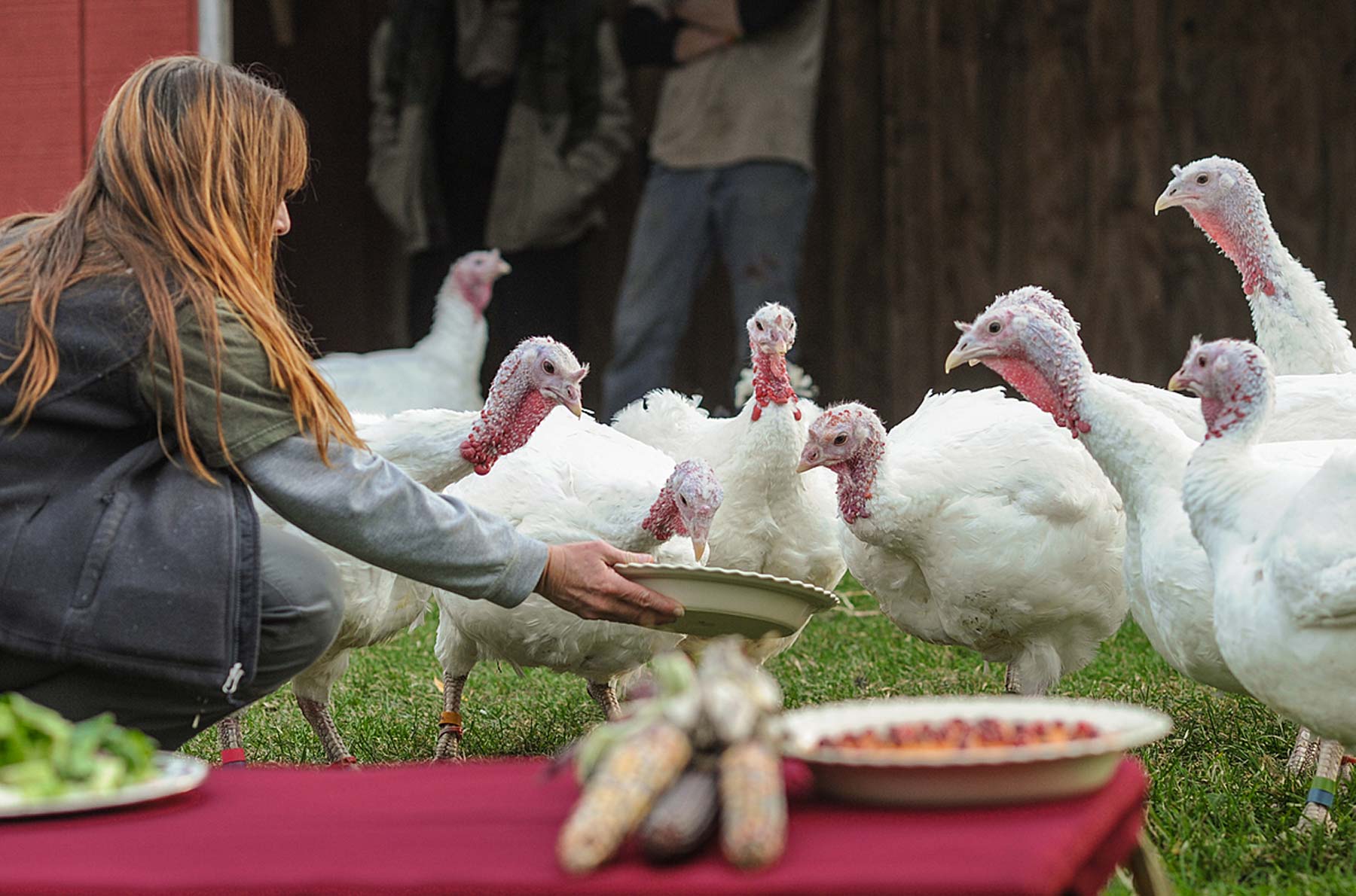
Conclusion
This Thanksgiving let’s do more than talk about gratitude; let’s make choices that lift up others, protect their rights, reduce their pain and protect them from illness and disease. We can bring real meaning to this important day, and help create a world that others can also be grateful for.
